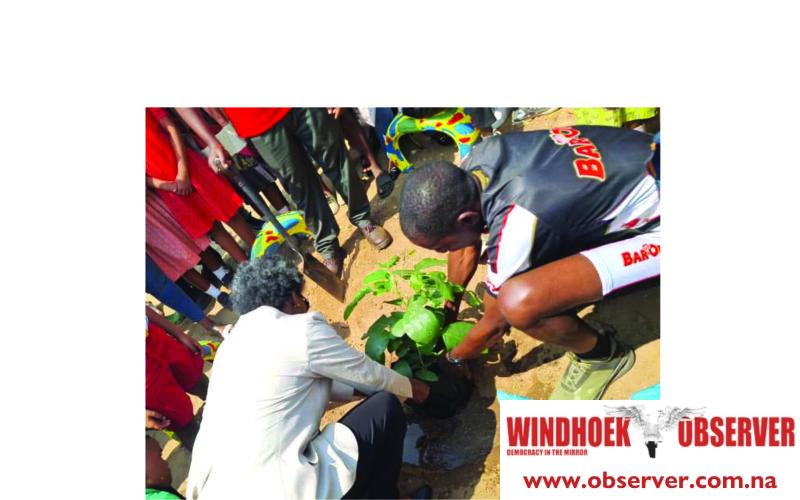Justicia Shipena
Environment, Forestry and Tourism minister Inidelni Daniel says she concerned over Namibians’ reluctance to replant trees despite the country losing thousands of hectares of forest each year to agriculture, mining, urban development, and infrastructure expansion.
Daniel said the continued loss of forests poses a serious threat to Namibia’s ecosystems and sustainability.
She said the practice of clearing land without replanting must stop.
“The Ministry has a responsibility to act and will begin enforcing a requirement for all individuals or entities that remove trees to replant them,” Daniel said during the 2025 Arbor Day commemoration at Michelle McLean Primary School in Otjomuise in Windhoek on Saturday.
She explained that this measure seeks to restore ecological balance and strengthen Namibia’s commitment to sustainable environmental stewardship.
Daniel said she was deeply concerned that while trees are cleared for development projects, few efforts are made to restore what is lost.
She urged Namibians to visit local nurseries, which provide subsidised and donated seedlings, and take advantage of the fruit, shade, and ornamental tree varieties available.
“Planting a tree is a powerful first step, but our true commitment lies in nurturing it to full maturity. That is how we build lasting change, one tree, one green space, one future at a time,” she said.
This year’s Arbor Day was held under the theme “Forest and Food”, focusing on the role of forests in supporting food security, nutrition, and livelihoods.
Daniel said trees are vital for clean air, water, and shelter and are key allies in the fight against climate change.
She warned that deforestation, over-exploitation, and fires continue to threaten Namibia’s forests and called for stronger action from both individuals and institutions.
Namibia’s forest conservation efforts are guided by the SADC forestry strategy (2020–2030), which focuses on governance, market access, sustainable management, and private sector involvement.
To complement these efforts, the ministry is working with the Deutsche Gesellschaft für Internationale Zusammenarbeit (GIZ) to develop a national strategy for afforestation and reforestation, expected to be completed in 2026.
The strategy aligns with Namibia’s Nationally Determined Contributions (NDCs) and aims to bring together national efforts such as Arbor Day and private sector initiatives under one coordinated framework.
Daniel questioned whether Namibia’s goal of planting one million trees over five years is enough to address the scale of forest loss.
“Let us raise our ambition and not settle for symbolic gestures, but strive for transformative impact,” she said.
She called on schools, communities, farmers, and businesses to join a national movement for large-scale reforestation and restoration.
“Let us plant not just trees, but hope – trees that restore degraded land, nourish ecosystems, and protect future generations from climate shocks,” she said.
Meanwhile, the City of Windhoek, in partnership with FNB Namibia, marked Arbor Day 2025 at the Onkugo Yepongo Community Centre in Okuryangava. More than 40 residents attended the event, each receiving vegetable seeds and a fruit tree to promote household-level food production and environmental awareness.
Windhoek mayor Ndeshihafela Larandja and FNB Head of SME Nesdha De Jongh led the symbolic tree planting, joined by local residents who pledged to nurture the trees to maturity. Larandja encouraged residents to form personal connections with their trees.
“Name your tree after something that reminds you of what truly matters in life and nurture it with love. Every tree we plant is a living promise, a promise of nourishment, healing, and environmental resilience,” she said.
She commended FNB Namibia for its continued support of the city’s greenery initiative, which has transformed Windhoek’s public spaces into greener and more welcoming areas.
De Jongh reaffirmed FNB’s commitment through the Greenery Project partnership, which has contributed 400 plants valued at N$900 000, including 300 indigenous trees and shrubs and 100 concrete pot plants placed across the city.
“The project focuses on replacing ageing exotic trees with drought-tolerant indigenous species to enhance Windhoek’s beauty and promote sustainable urban living,” De Jongh said.
One of the beneficiaries, Herman Kapukuru from the Tobias Hainyeko Constituency, said it was an honour for his community to host this year’s Arbor Day.
He urged residents to care for their fruit trees, saying they would provide nourishment and serve as a lasting source of community pride.
Arbor Day is a national observance encouraging individuals and groups to plant trees.
Namibia’s Tree of the Year for 2025 is the apple leaf tree (philenoptera violacea), a native species valued for its wood, animal fodder and medicinal uses.
Each year, an indigenous tree is selected to promote its cultivation in nurseries and communities across the country.
Caption
As part of the 2025 Arbor Day celebrations, Namibia planted the apple leaf tree.
- Photo: MEFT




